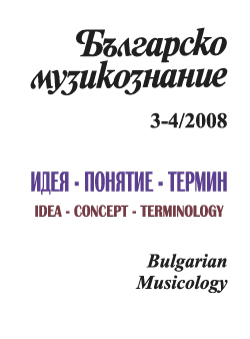Полюси и поляризиране в понятийния и терминологичен апарат на Арнолд Шьонберг като холистична автономна система
Dichotomies and Polarizations in Schoenberg’s Holistic Autonomous Conceptual and Terminological System
Author(s): Tsenka Yordanova Subject(s): Music
Published by: Институт за изследване на изкуствата, Българска академия на науките
Summary/Abstract: The subject of this study comprises the various kinds of dichotomies in Arnold Schoenberg’s thinking and his conceptual and terminological theoretical system, viewed as a holistic system. They are activated around the dichotomy between new music (neue Musik) on the one hand and old music (veraltete Musik) on the other. The musical codes and the lexicon of Schoenberg’s new music (neue Musik) must be made terminologically distinguishable, discriminative and differentiated within the context of its creation and founding, as well as with respect to the principles of old music (veraltete Musik), in which the reflection of musical facts is realized (retroactively) in a radically innovative way. The context of the founding of a new musical paradigm is also connected with the context of Schoenberg’s rethinking of the language of tradition. His goal was to validate a new, sharply dissonant musical language that would be logically equivalent and historically equal not only to the various codes used in the development of the late Romantic musical lexicon after the Tristan-chord, but also to extended late Romantic tonality. The challenges in creating the „new music“ (neue Musik) included his retroactive innovation and analysis of „old music“ (veraltete Musik). The tone-row technique in general and the twelve-tone technique in particular have transcended and suspended the functions of extended late Romantic tonality beyond the total resources of chromaticism. To put it in the broadest terms, the main integrating factor in the grounding and substantiating of Schoenberg’s conceptual and terminological system can be placed along the axis of the dichotomy between new and old music (neue Musik vs. veraltete Musik), in which the creation of new music is interpreted hermeneutically. In turn, the main differentiating factor is the opposition between the two leading models for thinking about musicality: the organism model (das Organismusmodell) and the logical model. These two types of functions and factors – integrating and differentiating – are projected onto each concrete element within the holistically imagined conceptual system. This study examines the main themes in Schoenberg’s theoretical thought; it also presents in greater detail his conceptions of coherence (Zusammenhang); continuity and comprehensibility (Fasslichkeit); intellectual antitheses such as pantonality vs. monotonality (Pantonalität vs. Monotonalität); and developing variation (entwickelnde Variation), among others. The study touches on questions such as the informational capacity of the terms functioning in a holistic conceptual system, as well as their mutual interpretive, hermeneutically circular validation. Despite the fact that the composer develops his most deeply innovative thinking in the sphere of musicology (Musikwissenschaft) within his systematic and descriptive technical analysis, his research approach, as well as his entire intellectual attitude, contains an anti-doctrinal...
Journal: Българско музикознание
- Issue Year: 2008
- Issue No: 3-4
- Page Range: 139-158
- Page Count: 20
- Language: Bulgarian
- Content File-PDF

